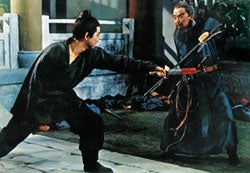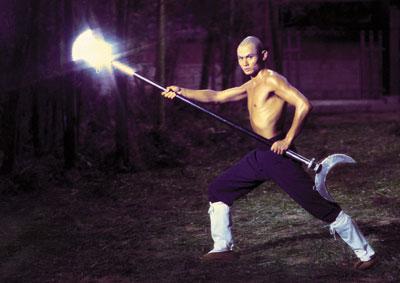Download Heroic Grace: The Chinese Martial Arts Film catalog (PDF)
"[The tour] gives Western viewers a chance to discover the rich tradition underlying the genre—and to see in beautiful widescreen prints some of the genre’s best and most entertaining representatives." —Chris Fujiwara, The Boston Phoenix
Highlights from "Heroic Grace: The Chinese Martial Arts Film" will screen for audiences outside of Los Angeles in select North American venues, and has been made possible with Presenting Sponsorship from:

Additional sponsorship has been provided by Cathay Pacific Airways.
The Tour
The program consists of the following eight classic Shaw Brothers titles:
New 35mm Print!
COME DRINK WITH ME (Da Zui Xia) (1966, Hong Kong)
Directed by King Hu

A young magistrate escorting prisoners is kidnapped by Jade-Faced Tiger (Chen Honglie), whose gang of unsavory thugs is holed up in a temple, under the protection of a mysterious abbot. A handsome warrior, Golden Swallow, effortlessly wards off an attack by the gangsters at a country inn, after which a drunken beggar (Yue Hua) stumbles into the scene, asking for a drink. Thus the stage is set for a typically dazzling and elegant film by master director King Hu in which nothing is what it seems. For starters, Golden Swallow is the governor's daughter, on a mission to rescue her kidnapped brother. She is played by Zheng Peipei, one of the most distinguished martial arts actresses of her time. Further surprises await…
Shaw Brothers. Producer: Run Run Shaw. Screenwriter: King Hu, Er Yang. Cinematographer: He Lanshan. Editor: Jiang Xinglong. Martial Arts Director: Han Yingjie. Cast: Zheng Peipei, Yue Hua, Chen Honglie, Li Yunzhong. Presented in Mandarin dialogue with English subtitles. 35mm, 94 min.
New 35mm Print!
GOLDEN SWALLOW (Jin Yanzi) (1968, Hong Kong)
Directed by Zhang Che
A nominal sequel to King Hu's COME DRINK WITH ME, GOLDEN SWALLOW takes its title from the heroine of Hu's film but, in line with director Zhang Che's proclivity for male-centered stories, reorients the plot around a tormented wandering swordsman. The film's true protagonist is thus Silver Roc, the brooding knight portrayed by Zhang stalwart Jimmy Wang Yu. A prototype for the conflicted male antiheroes that would dominate virtually all of Zhang's subsequent films, Silver Roc is a psychologically complex figure, drawn to violence and driven by a death wish while at the same time possessed of a poetic sensibility and powerful romantic yearnings. In Zhang's characteristically tragic scheme, these warring tendencies inevitably bring about the warrior's downfall.
Shaw Brothers. Producer: Runme Shaw. Screenwriter: Zhang Che. Cinematographer: Bao Xueli. Editor: Jiang Xinglong. Martial Arts Director: Tong Gai, Lau Kar-leung. Cast: Jimmy Wang Yu, Zheng Peipei, Luo Lie, Zhao Xiuyan. Presented in Mandarin dialogue with English subtitles. 35mm, 108 min.
"[The genre] wasn't all Jackie Chan-style comedic action and John Woo's bullet ballets, as these eight miraculous slices of high-flying action prove with timeless—and honorable—force."—The Austin Chronicle
VENGEANCE! (Baochou) (1970, Hong Kong)
Directed by Zhang Che
Zhang Che transitioned from the swordplay subgenre with this ultraviolent revenge drama set against the (relatively) modern backdrop of China's early republican period. David Jiang (David Chiang) and Di Long (Ti Lung)—Zhang's preferred pairing of heroes throughout the '70s—star in their first film together: Di as a dignified Beijing opera performer whose murder at the hands of a corrupt local cabal launches his mysterious white-suited brother—a relentless, wraithlike Jiang—down the path of bloody retribution. VENGEANCE! heralded the rise of '70s kung fu and radically revised narrative and stylistic templates at the Shaw Brothers' studio. Even Bruce Lee paid homage to the white suit in THE CHINESE CONNECTION (1972; aka FIST OF FURY in Hong Kong).
Shaw Brothers. Producer: Runme Shaw. Screenwriter: Ni Kuang. Cinematographer: Gong Muduo. Editor: Jiang Xinglong. Lyrics: Tong Kai. Cast: David Jiang, Di Long, Wang Ping, Ao Yanjing. Presented in Mandarin dialogue with English subtitles. 35mm, 103 min.
ONE-ARMED SWORDSMAN (Dubi Dao) (1967, Hong Kong)
Directed by Zhang Che

The eponymous hero Fang Gang, played with sullen charisma by Jimmy Wang Yu, is an orphaned "scholarship student" at a martial arts academy, a resentful commoner persecuted by the sneering gentry. He endures their bullying stoically, until his sifu's spoiled daughter spies the muscular peasant chopping wood, shirtless and gleaming. Infuriated by her own desire, she ends up lopping off one of his arms. During a sojourn in the wilderness, Gang masters the unfamiliar art of fighting left-handed and returns home to trounce his astonished enemies. Even in its visual details the film announces the arrival of a new kind of hero: Wang Yu wears simple, functional clothing modeled on the dusty homespun of the samurai films that inspired director Zhang and screenwriter Ni Kuang.
Shaw Brothers. Producer: Runme Shaw. Screenwriter: Ni Kuang, Zhang Che. Cinematographer: Yuan Zengshan, Guan Hanle. Editor: Jiang Xinglong. Martial Arts Director: Lau Kar-leung, Tong Kai. Cast: Jimmy Wang Yu, Ban Yinze, Qiao Qiao, Zhang Beishan. Presented in Mandarin dialogue with English subtitles. 35mm, 111 min.
INTIMATE CONFESSIONS OF A CHINESE COURTESAN (Ai Nu) (1972, Hong Kong)
Directed by Chu Yuan
Imagine relocating the martial arts school to a brothel, and transposing the martial arts master to the brothel's madam and the martial arts disciple to a prostitute who must be forcibly drilled in the sexual arts of servicing men. Imagine also that the madam is a lesbian who abducts virgins to work in her brothel; that she both exploits and is genuinely in love with her protégée; and that the protégée only fakes subservience while secretly seeking bloody revenge against all who have wronged her. The ambience is baroque atmospherics spiced with a whiff of terror. The frame is that of a murder mystery, with the requisite police investigation. The slain and dismembered are almost all men. "Perversity" meets swordplay, and the result is "pulp poetry." (Tony Rayns)
Shaw Brothers. Producer: Runme Shaw. Screenwriter: Qiu Gangjian, Jiang Xinglong. Cinematographer: Wu Zhuohua. Editor: Li Yanhai. Martial Arts Director: Xu Erniu. Cast: Lily He Lili, Yue Hua, Bei Di, Dong Lin. Presented in Mandarin dialogue with English subtitles. 35mm, 90 min.
"A fascinating series of films and a tantalizing introduction to a genre that has gone from being a cultish passion for some Western viewers to a style that permeates popular culture."—NOW magazine, Toronto, Ontario
New 35mm Print!
BLOOD BROTHERS (Ci Ma) (1973, Hong Kong)
Directed by Zhang Che
This widescreen epic of love, loyalty and betrayal is based on actual events that have become legend, spawning several film versions. Zhang's retelling finds David Jiang and newcomer Chen Guandai as bandit brothers who befriend young general Di Long after trying to rob him. The stage is set for tragedy when Di Long falls for Chen's neglected wife. From one tortured hero in THE ONE ARMED SWORDSMAN to two in VENGEANCE!, Zhang here has three protagonists, the better to indulge his passion for sadomasochistic display of the male body under duress. This threesome whose devotion eventually turns to jealousy, treachery and revenge prefigures John Woo's BULLET IN THE HEAD, and indeed, Woo served as assistant director on BLOOD BROTHERS.
Shaw Brothers. Producer: Runme Shaw. Screenwriter: Ni Kuang, Zhang Che. Cinematographer: Gong Muduo. Editor: Guo Dinghong. Martial Arts Director: Tong Kai, Lau Kar-leung. Cast: David Jiang, Di Long, Chen Guandai, Jing Li. Presented in Mandarin dialogue with English subtitles. 35mm, 118 min.
New 35mm Print!
THE 36TH CHAMBER OF SHAOLIN (Shaolin Sanshiliu Fang) (1978, Hong Kong)
Directed by Lau Kar-leung
A bald and tautly muscled Lau Kar-fai (Gordon Liu Jiahui) headlines this exhilarating rendition of the legendary dissemination of the Shaolin martial arts. Lau plays a real-life figure long-since transmuted into myth, a Chinese commoner on the run from Manchu oppressors (including a glowering Luo Lie) who seeks refuge at the Shaolin Temple. The film is an absorbing account of his initiation into the vaunted Shaolin style, known for its emphasis on the external and the physical. But as depicted here the training process is very much an inner voyage of discovery: The novice must work his way through a series of torturous "chambers" before becoming the newly minted monk, San De.
Shaw Brothers. Producer: Run Run Shaw. Screenwriter: Ni Kuang. Cinematographer: Huang Yuedai. Editor: Jiang Xinglong. Martial Arts Director: Lau Kar-leung, Tang Weizheng. Cast: Lau Kar-fai, Luo Lie, Yu Yang, Wang Yu. Presented in Mandarin dialogue with English subtitles. 35mm, 118 min.
New 35mm Print!
RETURN TO THE 36TH CHAMBER (Shaolin Dapeng Dashi) (1980, Hong Kong)
Directed by Lau Kar-leung

This quasi-sequel to the original, immensely popular THE 36TH CHAMBER OF SHAOLIN applies a light touch to the "warrior-in-training" subgenre and ably showcases director Lau Kar-leung's considerable talent for kung fu comedy. Lau Kar-fai reprises his starring role, but rather than a kung fu master he portrays a con man merely impersonating a Shaolin priest. A delightful self-parody and testament to Lau's refusal to facilely recycle the formula of his past success, RETURN TO THE 36TH CHAMBER cleverly subverts expectations while fulfilling the narrative and action requirements of the classic revenge plot.
Shaw Brothers. Producer: Run Run Shaw, Mona Fong. Screenwriter: Ni Kuang. Cinematographer: Ao Qiqun. Editor: Jiang Xinglong, Li Yanhai. Martial Arts Director: Lau Kar-leung, Qing Qu, Xiao Ho. Cast: Lau Kar-fai, Wang Longwei, Xiao Ho, Hua Lun. Presented in Mandarin dialogue with English subtitles. 35mm, 111 min.
© Series licensed by Celestial Pictures Ltd. (a company incorporated in Hong Kong SAR). All rights reserved.






 Mobile Navigation
Mobile Navigation

